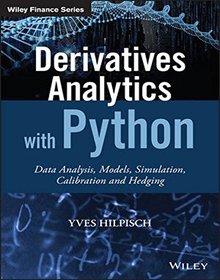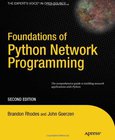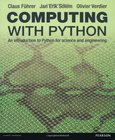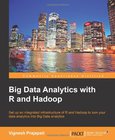Derivatives Analytics with Python
Data Analysis, Models, Simulation, Calibration and Hedging

Book Details:
| Publisher: | John Wiley & Sons |
| Series: | Wiley |
| Author: | Yves Hilpisch |
| Edition: | 1 |
| ISBN-10: | 1119037999 |
| ISBN-13: | 9781119037996 |
| Pages: | 376 |
| Published: | Jul 10 2015 |
| Posted: | Mar 29 2016 |
| Language: | English |
| Book format: | |
| Book size: | 6.47 MB |
Book Description:
Supercharge options analytics and hedging using the power of Python Derivatives Analytics with Python shows you how to implement marketconsistent valuation and hedging approaches using advanced financial models, efficient numerical techniques, and the powerful capabilities of the Python programming language. This unique guide offers detailed explanations of all theory, methods, and processes, giving you the background and tools necessary to value stock index options from a sound foundation. Youll find and use selfcontained Python scripts and modules and learn how to apply Python to advanced data and derivatives analytics as you benefit from the 5,000+ lines of code that are provided to help you reproduce the results and graphics presented. Coverage includes market data analysis, riskneutral valuation, Monte Carlo simulation, model calibration, valuation, and dynamic hedging, with models that exhibit stochastic volatility, jump components, stochastic short rates, and more. The companion website features all code and IPython Notebooks for immediate execution and automation. Python is gaining ground in the derivatives analytics space, allowing institutions to quickly and efficiently deliver portfolio, trading, and risk management results. This book is the finance professionals guide to exploiting Pythons capabilities for efficient and performing derivatives analytics. Reproduce major stylized facts of equity and options markets yourself Apply Fourier transform techniques and advanced Monte Carlo pricing Calibrate advanced option pricing models to market data Integrate advanced models and numeric methods to dynamically hedge options Recent developments in the Python ecosystem enable analysts to implement analytics tasks as performing as with C or C++, but using only about onetenth of the code or even less. Derivatives Analytics with Python Data Analysis, Models, Simulation, Calibration and Hedging shows you what you need to know to supercharge your derivatives and risk analytics efforts.
Download Link:
Related Books:
Foundations of Python Network Programming
The comprehensive guide to building network applications with Python
2nd Edition
This second edition of Foundations of Python Network Programming targets Python 2.5 through Python 2.7, the most popular production versions of the language. Python has made great strides since Apress released the first edition of this book back in the days of Python 2.3. The advances required new chapters to be written from the ground up, and others to be extensively revised. You will learn fundamentals like IP, TCP, DNS and SSL by using working Python programs; you will also be able to familiarize yourself with infrastructure components like memcached and message queues. You can also delve into network server designs, and compare threaded approache...
Computing with Python
An introduction to Python for science and engineering
Python is a free open-source language and environment that has tremendous potential in the scientific computing domain. Computing with Python presents the programming language in tight connection with mathematical applications. The approach of the book is concept based rather than a systematic introduction to the language.It is written for a mathematical readership and is aimed at students with a mathematical background....
Big Data Analytics with R and Hadoop
Set up an integrated infrastructure of R and Hadoop to turn your data analytics into Big Data analytics Overview Write Hadoop MapReduce within R Learn data analytics with R and the Hadoop platform Handle HDFS data within R Understand Hadoop streaming with R Encode and enrich datasets into R In Detail Big data analytics is the process of examining large amounts of data of a variety of types to uncover hidden patterns, unknown correlations, and other useful information. Such information can provide competitive advantages over rival organizations and result in business benefits, such as more effective marketing and increased revenue. New methods of working with big data, such as Hadoop and MapReduce, offer alternatives to traditional data warehousing....
2007 - 2021 © eBooks-IT.org



